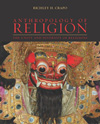
Anthropological Viewpoints about Religion |  |
Chapter Summary- Anthropologists emphasize the concept of culture and use fieldwork as an important method for gathering information about religion in its natural cultural setting.
- Anthropologists may approach religion from a scientific perspective that emphasizes the discovery of lawful regularities in religion and its relationships with the culture of which it is a part and the natural environment in which it is found. They may also approach religion from a humanistic perspective by describing religions in terms that will seem accurate portrayals by their followers and by explaining religion in ways that make it more understandable to people of other religious and cultural traditions.
- The great diversity of religious beliefs and practices makes it difficult to determine how religion should be defined.
- The first Victorian anthropologists who defined religion did so in cognitive terms, that is in terms of the kinds of beliefs it espouses. For instance, Sir Edward Tylor defined religion as the belief in spiritual beings such as spirits, ghosts, and gods.
- Affective definitions of religion saw feelings such as the awe, reverence, and dread that strange and unusual phenomena can elicit as more central to religion than its beliefs.
- Existential definitions focused on the role of religion as a mediator of values.
- Social order definitions shifted the spotlight to the social organization of religion, while behavioral definitions emphasized the importance of ritual and ceremony in religion.
- Most recently, some anthropologists have returned to the realm of religious thinking, but these cognitive definitions of religion have been framed in terms of the distinctive psychology of religious thinking rather than in terms of the substance of the beliefs that that thinking yields.
- All religions have three fundamental elements: religious ideology (supernatural beliefs and feelings), religious ritual, and religious social organization. Any complete description of a religion or of religion in general must consider all three.
- The supernatural beliefs of a religious ideology involve anthropomorphic thinking, thinking that interprets nonhuman things as having human-like characteristics. For instance, however the supernatural beings of a religion are conceived, they -- like human beings -- have intentions, the ability to think and reason, to feel emotions, and to choose to act on the world around them. Perhaps the most universal religious idea is that the supernatural -- even impersonal supernatural force -- can be influenced by symbols, symbols expressed in rituals and in language through prayer.
|
|
|